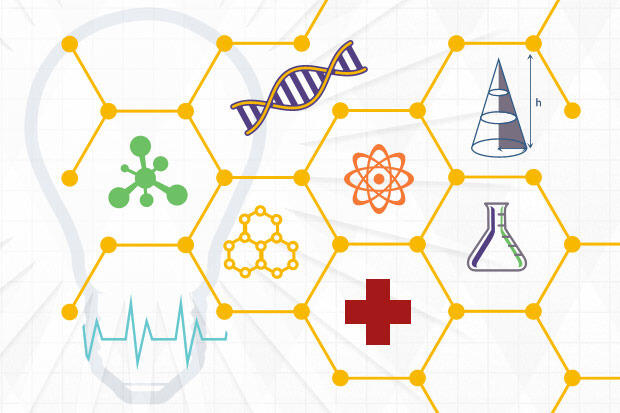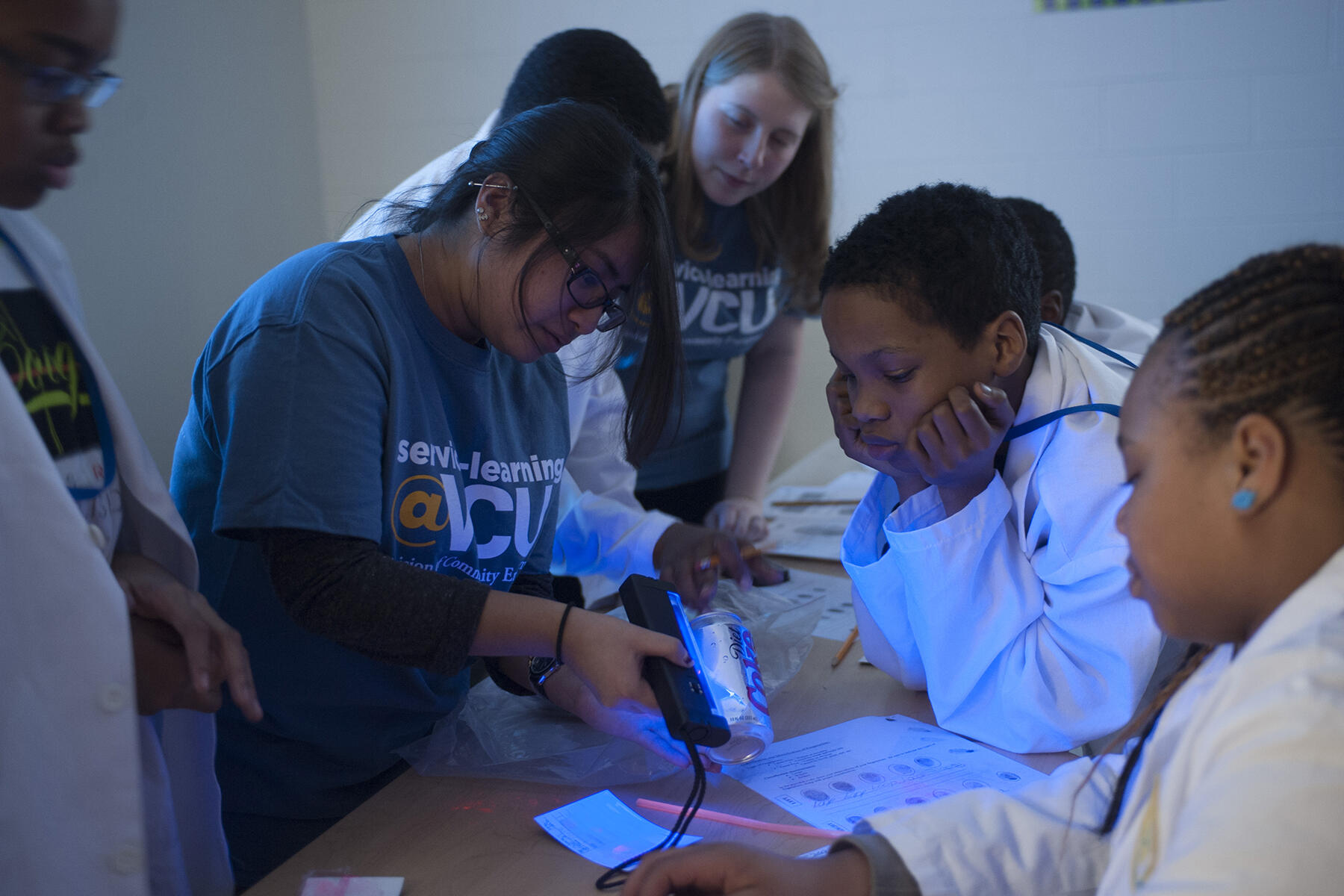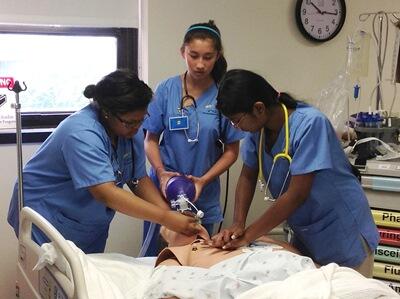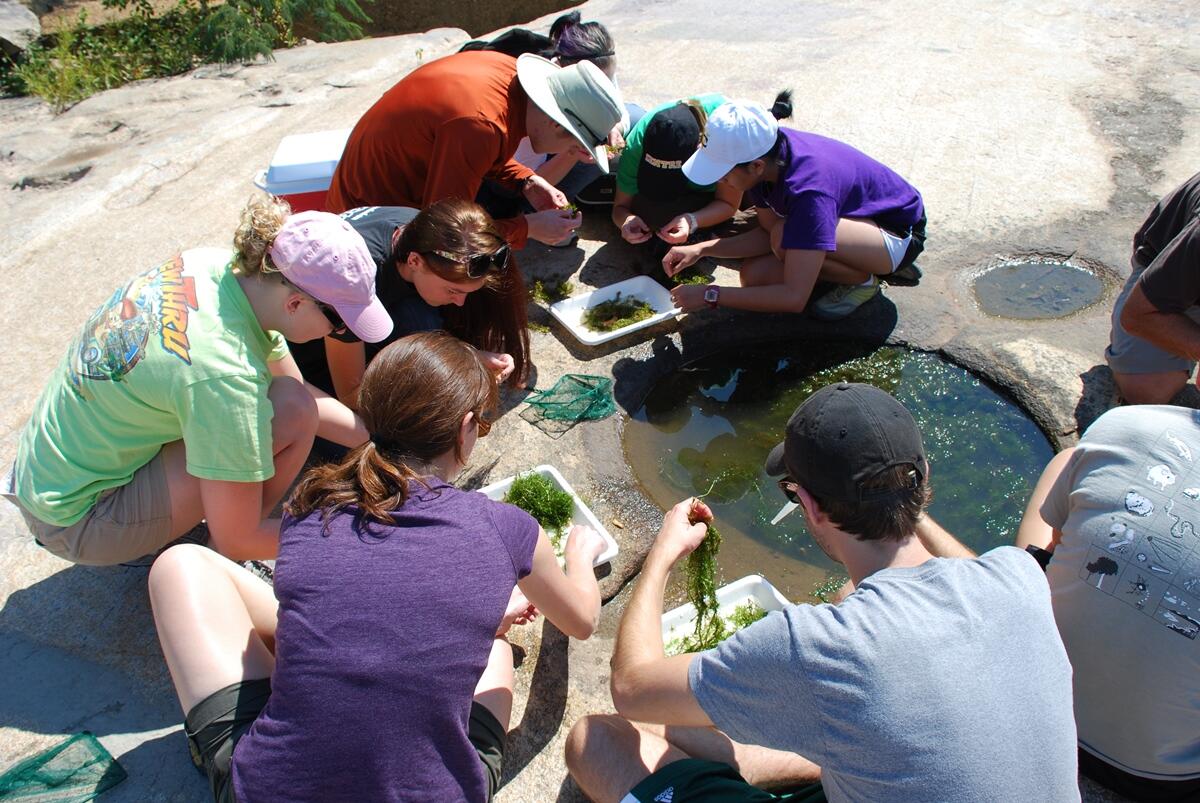
June 27, 2014
Eureka! VCU makes it easy for Richmonders to embrace their inner science nerds
Share this story

Scientific discoveries are transforming the world around us in remarkable ways.
The scientist at the lab bench working to unravel the molecular underpinnings of cancer provides important insight for the development of novel anti-cancer drugs for patients. The biologist in the field is exploring how best to conserve and restore wetlands, a critical habitat for key species of wildlife that could otherwise perish if this important resource is lost. And there’s the engineer working to fabricate microscale silk protein patterns for use in tissue engineering and environmentally sound devices called “green devices,” instead of using plastics.
On a daily basis, you’ll find this work taking place across Virginia Commonwealth University’s campus by faculty researchers and students.
Taking the wonder of discovery to the Richmond community has become a priority at VCU. Through educational and social programs, VCU is making science easier to grasp and more accessible and is spreading the word of how science impacts our everyday life – and will continue to do so as we move into the future.
Below are just a few of the ways VCU is making its mark and sharing the promise of discovery with the community at large.
For the kids
VCU has programs geared to Richmond-area elementary, middle and high school students that provide exposure to science, engineering and medicine in the coolest way possible: through interactive and hands-on learning.
· Last fall, the VCU Division of Community Engagement launched a program in which forensic experts from the College of Humanities and Sciences teach crime-scene techniques to students from Martin Luther King Jr. and Fred D. Thompson middle schools in Richmond and Fairfield Middle School in Henrico. The middle schoolers had the opportunity to tinker with “CSI-”style techniques such as fingerprint and blood spatter analysis, DNA sample testing and crime-scene processing.
· Another hands-on learning experience is the Girl Scouts Science Fun Day at VCU – an annual event hosted by the university’s Women in Science student organization, that introduces science and engineering to young women between the ages of 9 and 12. Gathering in small groups, the girls rotate through a series of stations where they gain exposure to clinical lab sciences, DNA structures, pathology, biomedical engineering and forensic science.

· Children from kindergarten through 12th grade have a chance to get up close and personal with health care professions through the VCU Jump Rope to Stethoscope, a community outreach program. Children can participate in nursing camps, school career days, hospital tours, health care clubs and courses offered at Martin Luther King Jr. Middle School. The program is offered through the VCU Health System Human Resources’ Office of Workforce Development and Strategy.
· VCU Life Sciences developed the Secrets of the Sequence, a series of videos about advances in the life sciences that take area students and teachers, such as those at James River High School, inside the laboratories of leading scientists and ethicists. The videos are used to spark conversation in classrooms about the power of discovery in the life sciences – from botany to genetics to biotechnology. The Secrets of the Sequence series was produced by Ward Television of Washington, D.C.

Science in the park
In recent years, Richmond has stepped into the spotlight as one of the best river towns in the nation. Outdoor enthusiasts and avid bird watchers from across the country come to visit the parks along the James River to meet with adventure and commune with nature.
To raise awareness of the unique wildlife and ecology of the area, VCU has teamed up with community partners to launch a website about the science found in every corner of James River parks. Science in the Park showcases everything from geology, plant and animal life, rock pools and more. Using a smartphone as a walking companion, visitors to the parks can take a guided tour through the fall zone geology. And area students can learn about the one-of-a-kind nature of the James River by clicking through the site to view videos and lectures featuring local experts. Science in the Park is a partnership between VCU Rice Rivers Center, VCU Life Sciences Outreach Education and Friends of the James River Park. The project was supported by a grant from Altria.
Improving the health of the community
Throughout the year, the VCU Medical Center offers a series of free educational health seminars for the public to learn more about trends and breakthroughs in heart health, cancer treatment, epilepsy, gynecologic care and more. The seminars are offered at Lewis Ginter in Richmond, or at Belmont in Fredericksburg, and feature leading VCU physicians and researchers who share the latest health information and answer questions on a variety of current topics in health care.
The Healthy U, 7th District Health and Wellness Initiative was launched in 2009 by Cynthia Newbille, Richmond city councilwoman, who saw a need to improve the health of citizens in Richmond’s East End, where many were plagued with negative health outcomes and were suffering long-term complications due to diabetes and hypertension. Ultimately, the goal is to promote community health and wellness and to improve quality of life for residents throughout the city of Richmond. Along with VCU, collaborating partners include churches, the city health department, Bon Secours Richmond Health System, doctors in private practice, Sports Backers, YMCA, the Minority Health Consortium and others.
Science socials
Science Pub RVA is what happens when you mix a curious audience of citizens with creative scientists – a fun and meaningful conversation about discoveries that are transforming the world we live in. Science Pub RVA is one example of a growing trend in science cafés that have been popping up across the country in recent years. The events take science to a relaxed setting, often hosted at The Camel in Richmond, and no prior science background is necessary.
While Science Pub RVA is not a VCU initiative in itself, many reputable experts and researchers from the university have been invited to kick back and share their excitement about science and society. Past presenters have included VCU’s Danielle Dick, Ph.D., from the VCU School of Medicine (“To Drink or Not to Drink: Is Alcoholism ‘In Our Genes’?”); Karla Mossi, Ph.D., from the VCU School of Engineering (“Science Fiction or Science Fact”); Everett Carpenter, Ph.D., from the VCU College of Humanities and Sciences (“Magnets Matter: The History and Role of Magnets in Consumer Alternative Energy Applications”); and many others.
For more information on Science Pub RVA, visit http://sciencepubrva.org/.
Subscribe for free to the weekly VCU News email newsletter at http://newsletter.news.vcu.
Subscribe to VCU News
Subscribe to VCU News at newsletter.vcu.edu and receive a selection of stories, videos, photos, news clips and event listings in your inbox.













